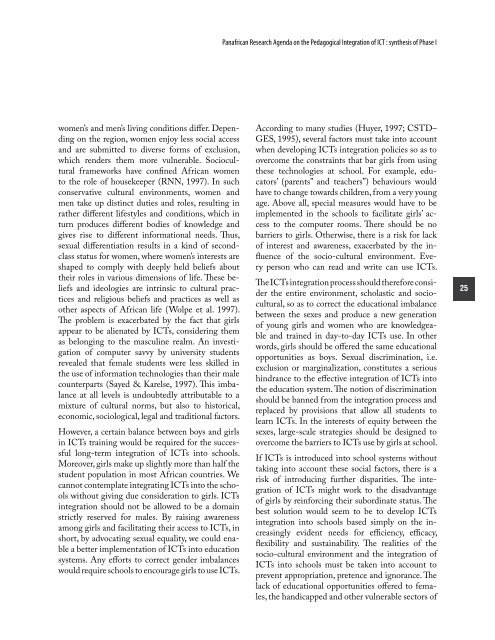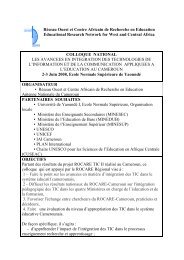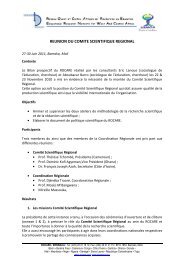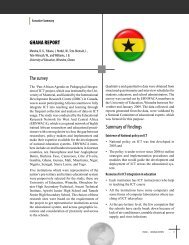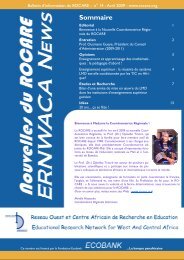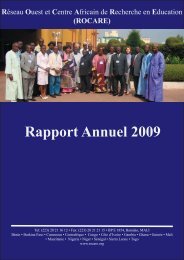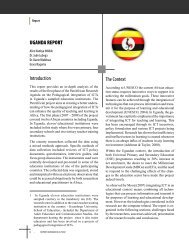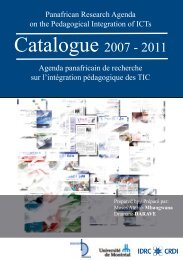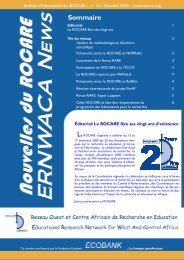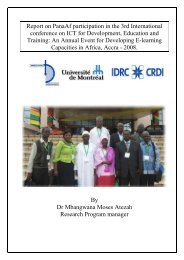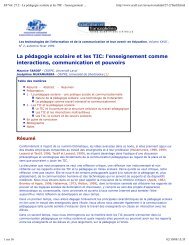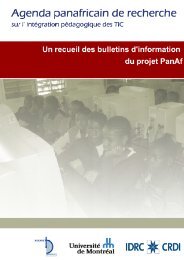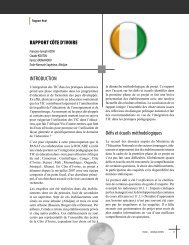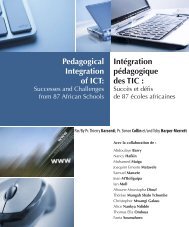Download the full report - ERNWACA
Download the full report - ERNWACA
Download the full report - ERNWACA
Create successful ePaper yourself
Turn your PDF publications into a flip-book with our unique Google optimized e-Paper software.
Panafrican Research Agenda on <strong>the</strong> Pedagogical Integration of ICT : syn<strong>the</strong>sis of Phase I<br />
women’s and men’s living conditions differ. Depending<br />
on <strong>the</strong> region, women enjoy less social access<br />
and are submitted to diverse forms of exclusion,<br />
which renders <strong>the</strong>m more vulnerable. Sociocultural<br />
frameworks have confined African women<br />
to <strong>the</strong> role of housekeeper (RNN, 1997). In such<br />
conservative cultural environments, women and<br />
men take up distinct duties and roles, resulting in<br />
ra<strong>the</strong>r different lifestyles and conditions, which in<br />
turn produces different bodies of knowledge and<br />
gives rise to different informational needs. Thus,<br />
sexual differentiation results in a kind of secondclass<br />
status for women, where women’s interests are<br />
shaped to comply with deeply held beliefs about<br />
<strong>the</strong>ir roles in various dimensions of life. These beliefs<br />
and ideologies are intrinsic to cultural practices<br />
and religious beliefs and practices as well as<br />
o<strong>the</strong>r aspects of African life (Wolpe et al. 1997).<br />
The problem is exacerbated by <strong>the</strong> fact that girls<br />
appear to be alienated by ICTs, considering <strong>the</strong>m<br />
as belonging to <strong>the</strong> masculine realm. An investigation<br />
of computer savvy by university students<br />
revealed that female students were less skilled in<br />
<strong>the</strong> use of information technologies than <strong>the</strong>ir male<br />
counterparts (Sayed & Karelse, 1997). This imbalance<br />
at all levels is undoubtedly attributable to a<br />
mixture of cultural norms, but also to historical,<br />
economic, sociological, legal and traditional factors.<br />
However, a certain balance between boys and girls<br />
in ICTs training would be required for <strong>the</strong> successful<br />
long-term integration of ICTs into schools.<br />
Moreover, girls make up slightly more than half <strong>the</strong><br />
student population in most African countries. We<br />
cannot contemplate integrating ICTs into <strong>the</strong> schools<br />
without giving due consideration to girls. ICTs<br />
integration should not be allowed to be a domain<br />
strictly reserved for males. By raising awareness<br />
among girls and facilitating <strong>the</strong>ir access to ICTs, in<br />
short, by advocating sexual equality, we could enable<br />
a better implementation of ICTs into education<br />
systems. Any efforts to correct gender imbalances<br />
would require schools to encourage girls to use ICTs.<br />
According to many studies (Huyer, 1997; CSTD–<br />
GES, 1995), several factors must take into account<br />
when developing ICTs integration policies so as to<br />
overcome <strong>the</strong> constraints that bar girls from using<br />
<strong>the</strong>se technologies at school. For example, educators’<br />
(parents” and teachers”) behaviours would<br />
have to change towards children, from a very young<br />
age. Above all, special measures would have to be<br />
implemented in <strong>the</strong> schools to facilitate girls’ access<br />
to <strong>the</strong> computer rooms. There should be no<br />
barriers to girls. O<strong>the</strong>rwise, <strong>the</strong>re is a risk for lack<br />
of interest and awareness, exacerbated by <strong>the</strong> influence<br />
of <strong>the</strong> socio-cultural environment. Every<br />
person who can read and write can use ICTs.<br />
The ICTs integration process should <strong>the</strong>refore consider<br />
<strong>the</strong> entire environment, scholastic and sociocultural,<br />
so as to correct <strong>the</strong> educational imbalance<br />
between <strong>the</strong> sexes and produce a new generation<br />
of young girls and women who are knowledgeable<br />
and trained in day-to-day ICTs use. In o<strong>the</strong>r<br />
words, girls should be offered <strong>the</strong> same educational<br />
opportunities as boys. Sexual discrimination, i.e.<br />
exclusion or marginalization, constitutes a serious<br />
hindrance to <strong>the</strong> effective integration of ICTs into<br />
<strong>the</strong> education system. The notion of discrimination<br />
should be banned from <strong>the</strong> integration process and<br />
replaced by provisions that allow all students to<br />
learn ICTs. In <strong>the</strong> interests of equity between <strong>the</strong><br />
sexes, large-scale strategies should be designed to<br />
overcome <strong>the</strong> barriers to ICTs use by girls at school.<br />
If ICTs is introduced into school systems without<br />
taking into account <strong>the</strong>se social factors, <strong>the</strong>re is a<br />
risk of introducing fur<strong>the</strong>r disparities. The integration<br />
of ICTs might work to <strong>the</strong> disadvantage<br />
of girls by reinforcing <strong>the</strong>ir subordinate status. The<br />
best solution would seem to be to develop ICTs<br />
integration into schools based simply on <strong>the</strong> increasingly<br />
evident needs for efficiency, efficacy,<br />
flexibility and sustainability. The realities of <strong>the</strong><br />
socio-cultural environment and <strong>the</strong> integration of<br />
ICTs into schools must be taken into account to<br />
prevent appropriation, pretence and ignorance. The<br />
lack of educational opportunities offered to females,<br />
<strong>the</strong> handicapped and o<strong>the</strong>r vulnerable sectors of<br />
25


